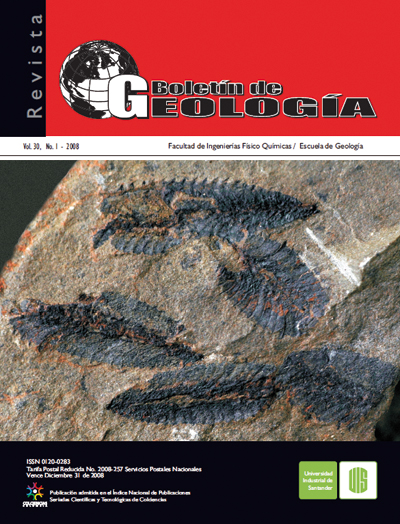DEPÓSITOS DE CIÉNAGA LEVANTADOS CERCA DE CARTAGENA DE INDIAS, EVIDENCIAS DE INESTABILIDAD EUSTÁTICA Y CLIMÁTICA DURANTE EL HOLOCENO SUPERIOR
Published 2009-10-20
How to Cite
Abstract
The marsh deposits cropping out near Galerazamba are located at 15 m above sea level and at a distance of 1,250 m from the present day Ciénaga El Totumo. This location suggests frequent changes in the sea level. A radiocarbon age of 4,150±50 yr BP was obtained from mollusc remains at the Ciénaga El Totumo. The age of the marsh corresponds to a dry climate period according to paleoenvironmental data from the northern part of South America. The Ciénaga El Totumo retreated during this dry episode. The fossil biota content found in these raised marsh deposits is poorly diversifed and corresponds to the inner part of the marsh.
Keywords: Marsh deposits; Ciénaga El Totumo; Colombia; Late Holocene; Molluscs; C-14.
Downloads
References
Barrera, R. 2001. Geología de las planchas 16-17 (Galerazamba) y (Barranquilla). Ingeominas. Memoria Explicativa, pp.3-54
Behling, H., and Hooghiemstra, A.1998. Late Quaternary palaeoecology and palaeoclimatology from pollen records of the savannas of the Llanos Orientales in Colombia, Palaeogeography, Palaeoclimatology, Palaeoecology, 139(3-4):251-267.
Bueno, R.1970. A Guidebook to the geology of the Tubará Region, Lower Magdalena Basin. The Colombian Society of Petroleum Geologists and Geophysicists, Eleventh Field Conference: 299-324
Burel, T., Klingebiel, A., et Vernette,G. 1981. Indice d’une ligne de rivage émergée dans la région de Cartagena (Colombie). Bulletin Institut de Géologie du Bassin d’Aquitaine, Bordeaux, (29): 161-166
Burel, T. y Vernette, G.1981. Evidencias de cambios de nivel del mar en el cuaternario de la región de Cartagena (Bolivar). Revista Ciaf, 6(1-3): 77-92
Buroker, N.E., Hershberger, W.K., and Chew, K.K. 1979. Population genetics of the family Ostreidae. II Interspecific studies of the genera Crassostrea and Saccostrea. Marine Biology, 54: 71-184
Cosel, R. von 1986. Moluscos de la región de la Ciénaga Grande de Santa Marta (Costa Caribe de Colombia). Anales del Instituto de Investigaciones Marinas de Punta Betín, (15-16): 79-370
Diaz, J. M., y Puyana, M. 1994. Moluscos del Caribe Colombiano. Un Catálogo ilustrado. Colciencias, Fundación Natura, Invemar, 291 p
Dickerson, P.W. (Eds.). American Association of Petroleum Geology, Mem. 29: 329-351
Duque-Caro, H.1979. Major structural elements and evolution of Northwestern Colombia.In: Geological and Geophysical Investigations of Continental Margins (J.S. Watkins, J.S. Montader,J.L. &
Duque-Caro, H. 1984. Structural style, diapirism and accretionary episodes of the Sinú-San Jacinto terrane, southwestern Caribbean borderlan.Geological Society of America, Mem. 162: 303-316
Galtsoff, P.S. 1964. The American oyster Crassostrea virginica Gmelin. Fischery Buletin, Fish wildlife Service, 64, 480p
Gayet, J., Vernette, G. 1984. Les lagunes cotieres. Bulletin Institut Géologique Bassin d’Aquitaine, Bordeaux, (45): 107-121.
